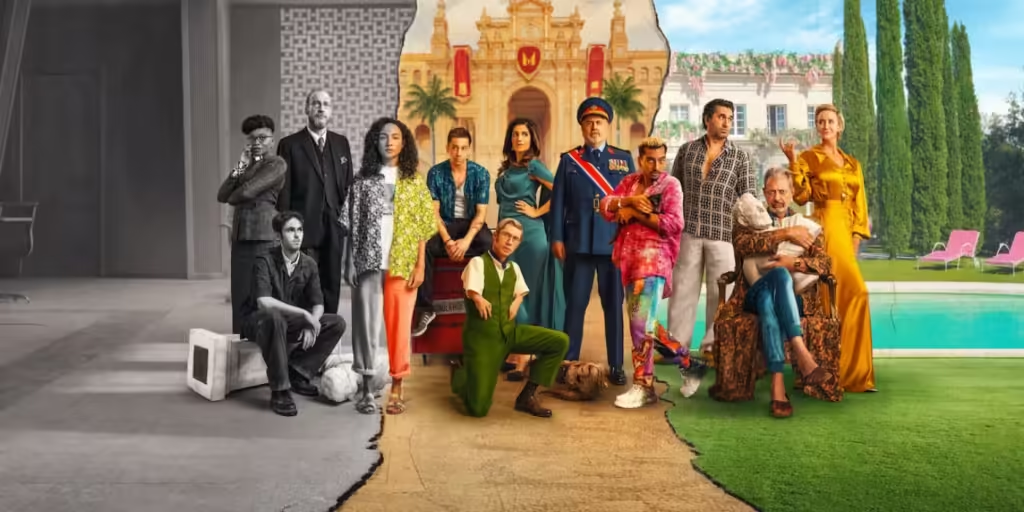Greek mythology has always been a fertile ground for countless adaptations across film, television, and other mediums. These stories of gods, titans, and mythical heroes have been told and retold for centuries, with creators often focusing on the divine feats and the grandiose tales of the gods. However, KAOS, Netflix’s new series created by Charlie Covell, offers a fresh spin on these mythological narratives, addressing a glaring problem that many adaptations have missed: the human perspective.
In a genre dominated by stories of larger-than-life deities, KAOS sets itself apart by putting the human experience front and center, highlighting the devastating impact of the gods’ whims on the lives of ordinary mortals. This bold approach not only makes the series more relatable but also reimagines what Greek mythology can be in a modern context.
A Unique Take on Modernizing Mythology
From the first episode, KAOS establishes itself as a mythological tale with a modern twist. The show is set in a world where ancient gods still reign, but society has evolved into something resembling our own. Technology and industry coexist with religious rituals, and sacrifices are still made to please the gods. The premise allows viewers to see familiar elements of modern life filtered through the lens of ancient myth, creating an intriguing mix of the contemporary and the archaic.
The show’s setting in a modernized Crete introduces us to a nervous Zeus (played by Jeff Goldblum) and his dysfunctional family, including Hera (Janet McTeer) and Dionysus (Nabhaan Rizwan). Zeus, convinced that a prophecy predicting his downfall is imminent, grows increasingly paranoid, while his divine counterparts deal with their own issues. However, what makes KAOS stand out isn’t just its portrayal of the gods but its dedication to showing how these gods’ actions wreak havoc on the lives of humans.
Shifting the Spotlight to Mortals
In most adaptations of Greek mythology, humans serve as little more than pawns or background characters in the epic tales of gods. KAOS breaks this mold by dedicating significant time to human stories and the suffering that results from divine interference. The character of Eurydice, or Riddy (played by Aurora Perrineau), is a prime example of this shift in focus. Known from mythology as the tragic lover of Orpheus, KAOS gives Riddy a more nuanced and personal narrative, one that explores her inner turmoil as she grapples with her failing marriage and the grief caused by the gods.
Through Riddy’s story, we see how human lives are caught in the crossfire of the gods’ petty squabbles and cruel whims. Her mother, for example, was forced to become a priestess and have her tongue ripped out, a fate orchestrated by the gods. This kind of personal suffering, often glossed over in mythology, is given full weight in KAOS. The focus on Riddy and other human characters, like Ariadne (Leila Farzad), illustrates the emotional toll of living in a world where gods hold ultimate power over life and death.
Exposing the Gods’ Cruelty
One of the key innovations in KAOS is its unflinching portrayal of the gods’ cruelty. In many traditional Greek myths, the gods are depicted as powerful but often indifferent or self-serving, treating human lives as mere playthings. While this element is present in KAOS, the series takes it a step further by showing the emotional and psychological damage these gods inflict on the mortals who worship them.
For instance, Ariadne’s story is particularly harrowing. Poseidon (Cliff Curtis) forced her father to have children, resulting in the decades-long torture of her twin brothers and a lifetime of guilt for Ariadne, who believes she accidentally killed her sibling. This kind of personal suffering is often overlooked in mythological retellings, but KAOS puts it at the forefront, using it to explore themes of trauma, loss, and helplessness in the face of divine power.
The most striking example of this cruelty comes when Hera discovers that Zeus has impregnated a mortal woman. In a fit of jealousy, Hera orders Zeus to dispose of the newborn, leading to one of the show’s most chilling moments. Scenes like this serve as a reminder that, for all their power, the gods are often as flawed and vindictive as the mortals who worship them.
A Fresh Approach to Mythological Storytelling
By focusing on the human cost of the gods’ actions, KAOS offers a more grounded and emotionally resonant take on Greek mythology. While many adaptations celebrate the grandeur and spectacle of divine beings, this series chooses to examine the darker side of these tales—the collateral damage left behind by the gods’ whims.
This focus on humanity doesn’t mean that the gods are sidelined. Entire episodes revolve around their machinations, and the show still delivers the mythical elements that fans of the genre crave. However, KAOS uses these divine stories as a backdrop for the more intimate, human drama unfolding on the ground. The result is a mythological adaptation that feels fresh, relevant, and deeply moving.
Conclusion: A Mythic Adaptation for a Modern Audience
KAOS breathes new life into Greek mythology by addressing a major flaw in most adaptations: the lack of focus on the human experience. By giving voice to the mortals who suffer under the gods’ rule, the series adds a layer of depth and emotional complexity that is often missing from mythological retellings. The gods may still hold the power, but KAOS makes it clear that it’s the humans—those who live and die by their whims—who truly carry the weight of these ancient stories.
With its innovative approach, strong performances, and modern sensibilities, KAOS is not only a must-watch for fans of Greek mythology but also for anyone interested in storytelling that challenges the status quo. The series is now available to stream on Netflix, offering a mythic journey unlike any other.
